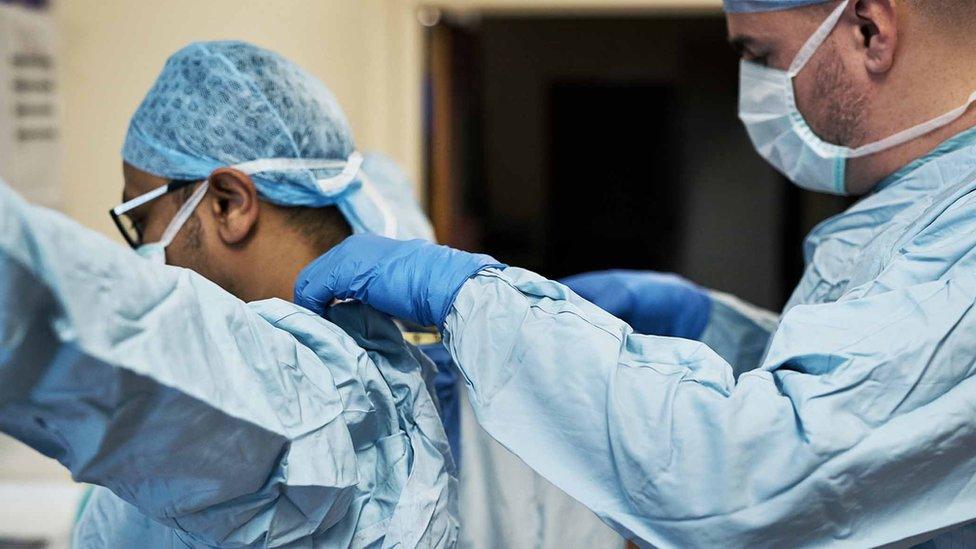Covid spending: Watchdog finds MPs' contacts were given priority
- Published
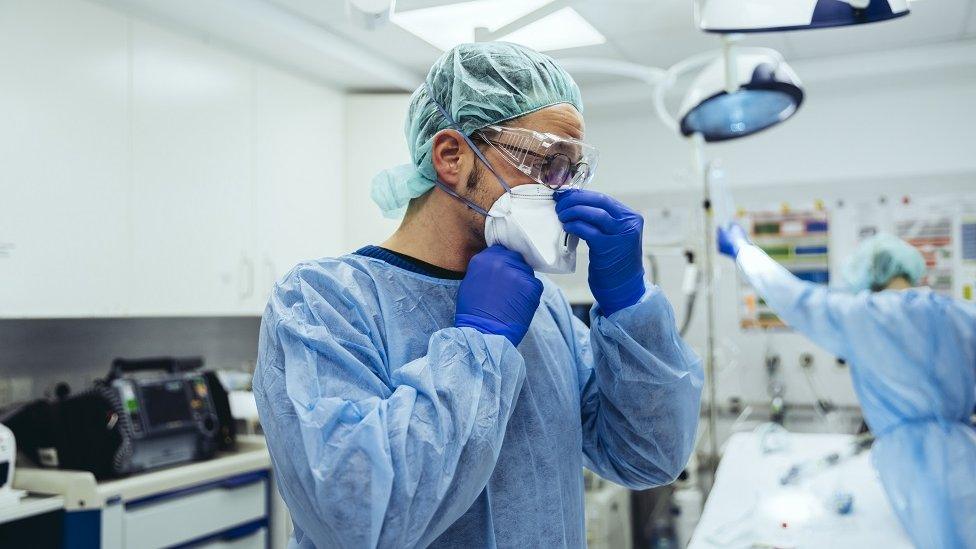
80% of the contracts were for personal protective equipment
Companies recommended by MPs, peers and ministers' offices were given priority as the government raced to obtain Personal Protective Equipment, the National Audit Office found.
Over half of the £18bn spent on pandemic-related contracts was awarded without competitive tender, it said.
The spending watchdog said the government was not transparent about suppliers and services.
It also found there was inadequate explanation of key spending decisions.
The findings are part of an NAO investigation into government procurement during the COVID-19 pandemic.
The watchdog found not enough was done to address potential conflicts of interest by ministers and other government officials.
It found more than 8,600 coronavirus contracts had been awarded by 31 July, ranging in value from less than £100 to £410m.
Of these, £10.5bn-worth (58%) were awarded directly without a competitive tender process.
Personal protective equipment (PPE) accounted for 80% of the number of contracts awarded.
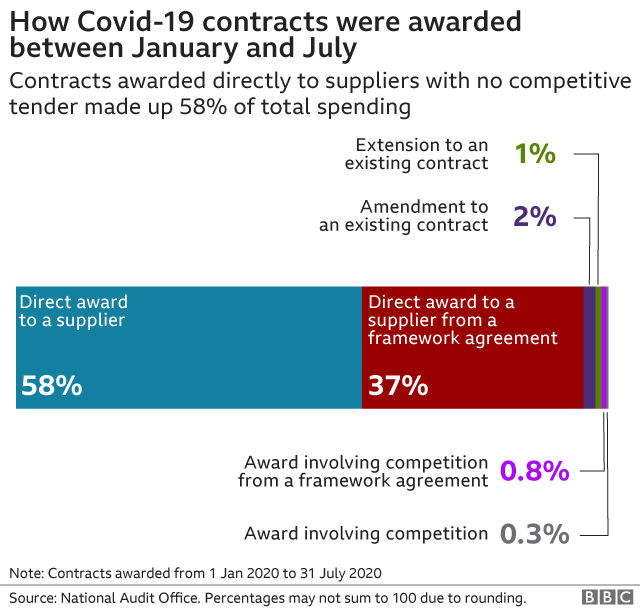
The report comes after the BBC revealed on Tuesday that a Spanish businessman who acted as a go-between to secure protective garments for NHS staff in the pandemic was paid $28m (£21m) in UK taxpayer cash.
Gabriel Gonzalez Andersson had been in line for a further $20m of UK public funds, documents filed in a US court reveal.
He worked with Florida-based jewellery designer Michael Saiger who set up a business at the start of the pandemic to supply PPE to governments.
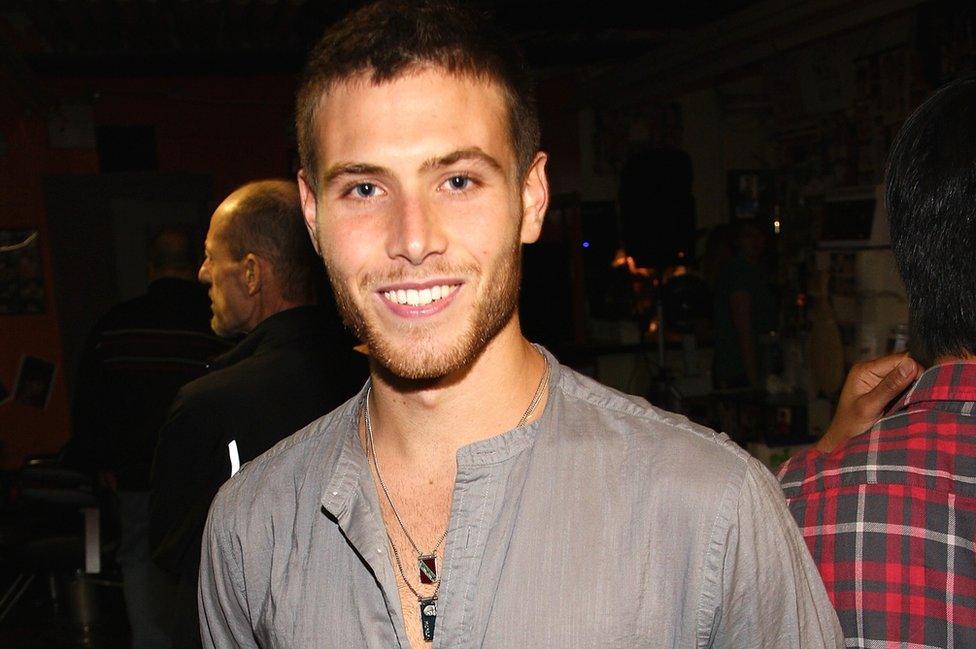
Florida-based jewellery designer Michael Saiger set up a business to supply PPE to governments
Meg Hillier, chairwoman of the Commons Public Accounts Committee, called for ministers to "come clean" and publish all information about the contracts awarded.
The government acknowledged it had procured services with "extreme urgency" during the crisis but it said it had "robust processes in place".
When asked about the $28m paid to the Spanish businessman, Business Secretary Alok Sharma told Radio 4's Today programme: "The Department of Health did look at that contract at the time."
"At the time there was huge pressure to get PPE into the system and that's what we did," he added.


The government is keen to note that the National Audit Office found "no evidence that ministers had been involved in either the award or management of the contracts" for £18bn of pandemic-related contracts.
It was under huge pressure to get more PPE immediately and was bidding against governments all over the world. It's even understandable that most of the contracts were awarded without the normal (and time-consuming) competitive tendering process that is there to ensure value for money for taxpayers - and to eliminate the risk that someone gets a lucrative public sector contract not because of what they offer but because of who they know.
But as the NAO points out, if you ditch that competitive process, the remaining safeguards - such as properly documenting what you've done to avoid conflicts of interest - become all the more important.
And if you have a process where companies referred by ministers' offices, MPs, peers and health chiefs get 'fast-tracked' - and are therefore ten times as likely to win a contract - there's an even stronger risk that contracts are seen to be awarded not on merit or value for money but because of personal connections.
To eliminate that risk, the public accounts committee chair Meg Hillier is calling for all contracts awarded so far to be published.

'Tip of the iceberg'
NAO head Gareth Davies said it remained "essential that decisions are properly documented and made transparent if government is to maintain public trust".
Ms Hillier, a Labour MP, said the failings uncovered may be the "tip of the iceberg".
"The government overlooked a serious conflict of interest, paid consultants for months before giving them contracts and purchased masks it knew weren't up to scratch.
"It's bad enough that it set up a 'high-priority lane' to fast-track companies with the right connections.
"But the failure to track how half the companies had ended up on it made it impossible to ensure proper safeguards were in place."
Declared interests
The NAO looked in detail at 20 contracts including:
A deal with research firm Public First, whose owners had "previously advised or worked with" Cabinet minister Michael Gove.
Artificial intelligence company Faculty, which was awarded contracts worth almost £3m. Cabinet Office minister Lord Agnew owned a £90,000 stake in the firm but has since relinquished it.
Ayanda Capital supplied 50 million masks that could not be used for their original purpose at a cost of £155m. The deal was brokered by a businessman who was an adviser to the government's Board of Trade at the time.
PestFix, a pest control company, was given contracts worth £350m, which included delivery of 600,000 masks which cannot be used for their original purpose.
The NAO concluded that in cases of potential conflicts of interest involving ministers, all had properly declared their interests and it found "no evidence of their involvement in procurement decisions or contract management".
The spending watchdog acknowledged the pandemic required acting with "extreme urgency" and the Public Contracts Regulations allowed an emergency response, including awarding deals directly without a formal competition.
Cabinet Office Minister Julia Lopez said: "We have been dealing with an unprecedented global pandemic that has posed the biggest challenge to the UK in a generation.
"As this report rightly recognises, we needed to procure contracts with extreme urgency to secure the vital supplies required to protect frontline NHS workers and the public and we make no apology for that.
"We have robust processes in place for spending public money to ensure we get critical equipment to where it needs to go as quickly as possible, whilst also ensuring value for money for the taxpayer.
"It is important to maintain the public's confidence in how we manage their money, and we welcome the NAO's scrutiny of our processes and recommendations on how they can be improved."
Tom Sasse from the think tank the Institute for Government, told Radio 5 Live's Wake Up To Money that procurement processes exist to make sure taxpayers get the best value for money.
"The NAO point to some pretty serious problems with how public procurement has happened during the pandemic," he said.
"We've also seen a big story in August around £150m that went on PPE that couldn't be used. So there are questions about how this process is working."
- Published17 November 2020
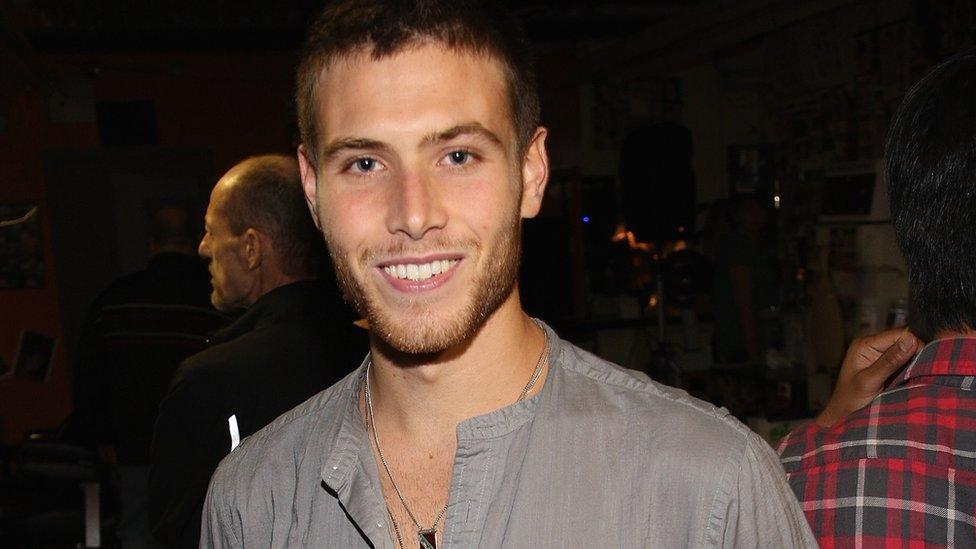
- Published12 November 2020
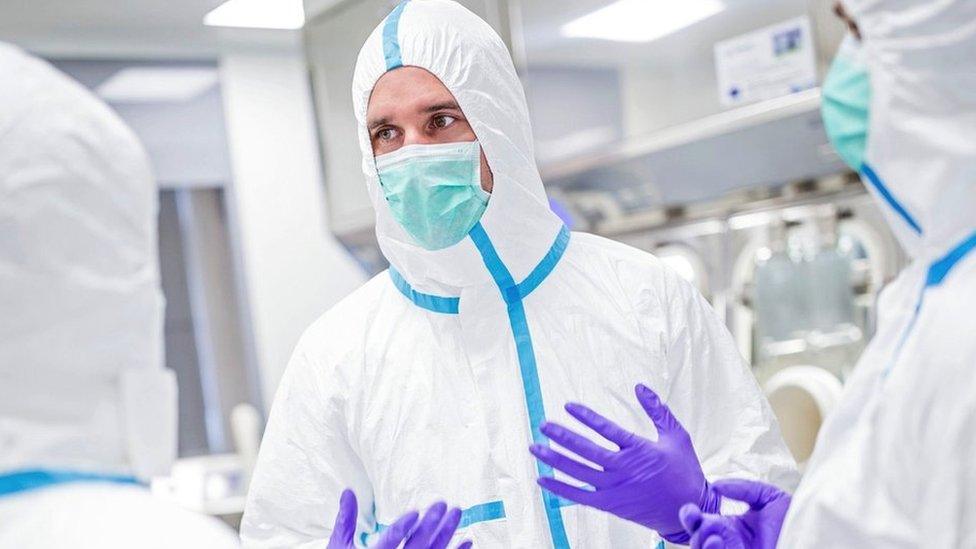
- Published6 August 2020

- Published12 June 2020
